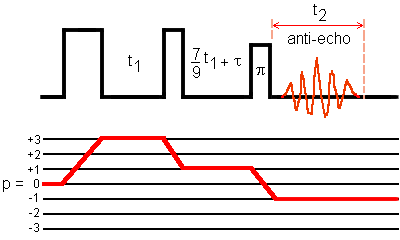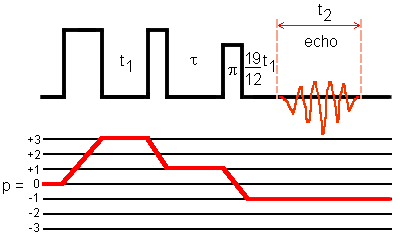
Split-t1 pulse program from Bruker for 3QMAS of half-integer spin quadrupole nuclei
Below NMR pulse program describes the split-t1 approach for (1D and 2D) +3Q-MAS experiment applied to quadrupolar nuclei with half-integer spin.

Fig. 1: Split-t1 3QMAS NMR pulse sequence and antiecho transfer pathway for a spin I = 3/2 system.

Fig. 2: Split-t1 3QMAS NMR pulse sequence and echo transfer pathway for a spin I = 5/2 system.
This NMR pulse program is for Bruker Avance spectrometers.
A pure absorption 2D spectrum is obtained without the shearing transformation.
; mq3p ; 3Q MAS pulse program for half-integer spin nuclei ; 3-pulse experiment with full echo acquisition: ; excitation(3Q) - conversion(1Q) - tau - 180° selective - ACQ(-1Q) ; uses split-t1 mode with the whole echo acquisition ; for split-t1 set increments as follows: ; for 3/2 nuclei set: in10 = in0*7/9, in11 = 0 ; for 5/2 nuclei set: in10 = 0, in11 = in0*19/12 ; for 7/2 nuclei set: in10 = 0, in11 = in0*101/45 ; or in10 = in11 = 0, if no split-t1 is desired ; 180° selective pulse should be determined first using Hahn-echo, ; this may also be used to check that full echo can be obtained ; from sample of interest. If no full echo can be obtained from ; sample, use mq3qzfil instead. ; Then optimise P2 and finally P1, 2 or more iterations for P1 and P2 ; may be needed. ;ns : 48*n ;d1 : recycle delay ;p1 : excitation pulse at pl11 ;p2 : conversion pulse at pl11 ;p4 : 180 degree selective pulse at pl21 ;cnst31 : MAS spin rate ;pl1 : = 120 db ;pl11 : power level for excitation and conversion pulses ;pl21 : power level for 180 degree selective pulse ;d6 : to allow full echo to build up ;l1 : number of rotor cycles for whole echo ;d10 : = 0 ;d11 : = 0 ;d0 : = 1u or longer ;in0 : 1 rotor period for synchronised experiment ;in10 : = in0*7/9 for 3/2-spin, ; = 0 for 5/2-spin and 7/2-spin ;in11 : = 0 for 3/2-spin, ; = 1n0*19/12 for 5/2-spin, ; = in0*101/45 for 7/2-spin ;td1 : number of t1-experiments ;FnMODE : QF ;MC2 : QF "d6=((1s*l1)/cnst31)-(p2/2)-(p4/2)" ; set the delay d6 according to l1 and cnst31 ; values by the spectrometer automatically, ze ; clear memory, new data replace old data, ; switch AD converter to replace mode, ; perform DS before next acquisition, 1 d1 ; recycle delay, 10u pl11:f1 ; 10 microsecond delay, ; set high power in f1 channel, (p1 ph1):f1 ; high-power excitation pulse, d0 ; delay between pulses, t1 increment, (p2 ph2):f1 ; high-power conversion pulse, d10 ; d6 ; delay tau calculated automatically, (p4 pl21 ph3):f1 ; low-power 180° pulse, d11 ; go=1 ph31 ; signal acquisition, ; loop to 1, NS times for averaging, d1 mc #0 to 1 F1QF(id0&id10&id11) ; delay for disk I/O, store signal, ; increase FID number, ; delete memory data, ; do not perform dummy scans ; with next acquisition, ; increment time d0 by in0, ; increment time d10 by in10, ; increment time d11 by in11, exit ; end of the pulse program ph1=(12) 0 1 2 3 4 5 6 7 8 9 10 11 ; excitation pulse phase ph2= 0 ; conversion pulse phase ph3=(4) 0 0 0 0 0 0 0 0 0 0 0 0 1 1 1 1 1 1 1 1 1 1 1 1 2 2 2 2 2 2 2 2 2 2 2 2 3 3 3 3 3 3 3 3 3 3 3 3 ; 180° pulse phase ph0= 0 ph31= 0 3 2 1 0 3 2 1 0 3 2 1 2 1 0 3 2 1 0 3 2 1 0 3 ; receiver phase
The phase cyclings of ph1, ph2, ph3, and ph31 are identical to those in pulse program phase modulated shifted-echo for I > 3/2 with 3 pulses. The is due to the fact that the three pulses and the coherence transfer pathways are identical in both sequences.
If the third pulse must be a strong RF pulse for better excitation of off-resonance nuclei, the phase cyclings of ph1, ph2, ph3, and ph31 are identical to those in pulse program phase-modulated shifted-echo for I > 3/2 with 3 strong pulses. However, there is no harm in applying these phase cyclings concerning 3-strong pulse sequence even when the third pulse is a weak RF pulse.